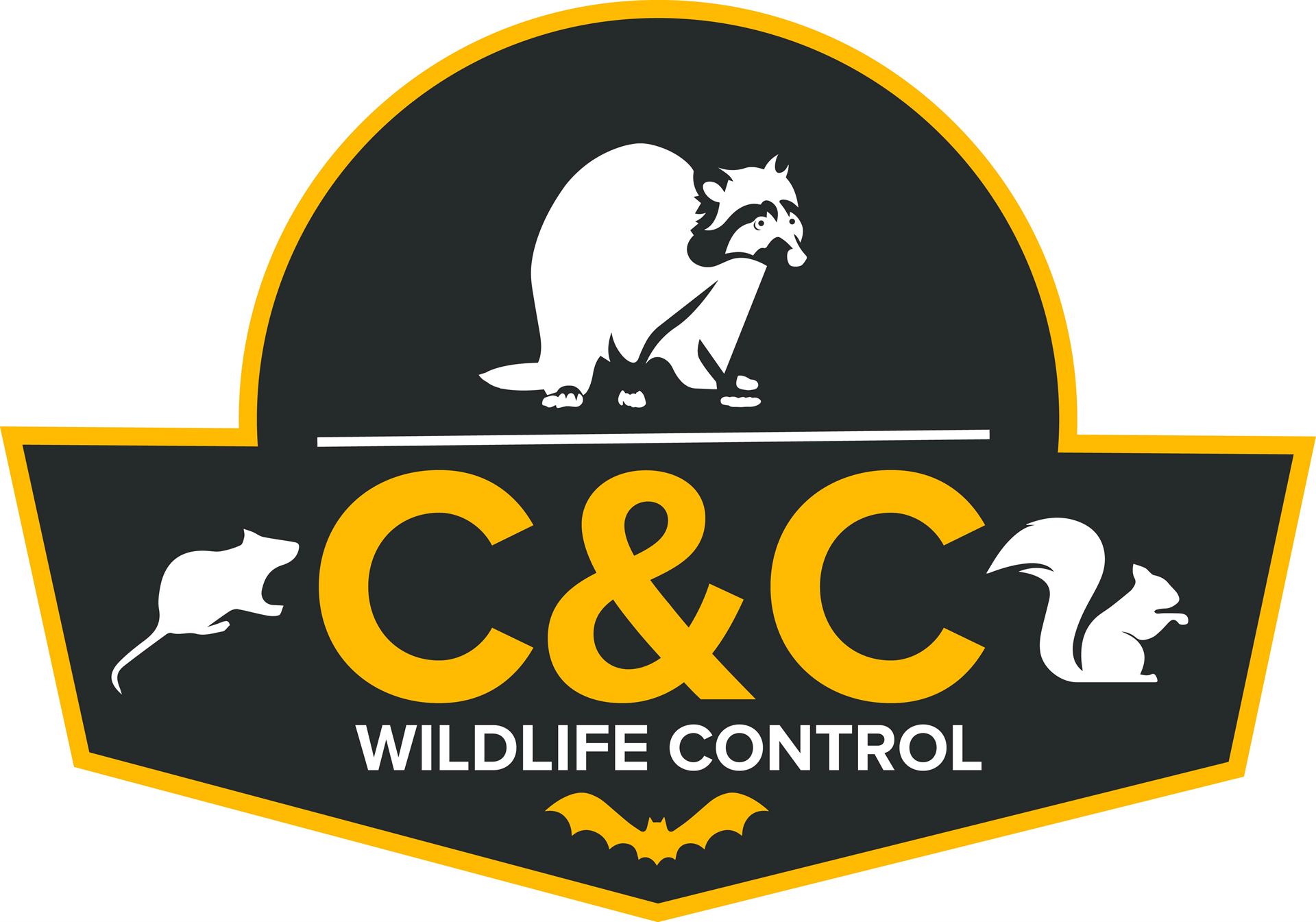Raccoon Removal
Raccoon Removal
Raccoons are widely regarded as one of the most adaptable and pervasive pests all over the state of Connecticut. While they can live virtually anywhere, raccoons prefer urban areas, as they provide easy food sources and warm shelters. In addition to their adaptability raccoons love invading homes and other buildings. Keep reading to find out more about raccoons and why they need to be removed quickly.
Why are raccoons attracted to my property?
As raccoons love their easy food sources, food is generally the primary reason that raccoons end up in your yard in the first place. Whenever pet food or trash is left out unsecured, raccoons will be the first animal to try to take advantage of it. In addition, any fruit trees are prime raccoon food, providing a lot of appeal for these critters.
When a raccoon decides to make its way into your home or other buildings it is usually for one reason. Generally, female raccoons are searching for a nice, warm place to raise their young. What better place is there than a nice warm building to raise their young? This can cause some big problems for homeowners.
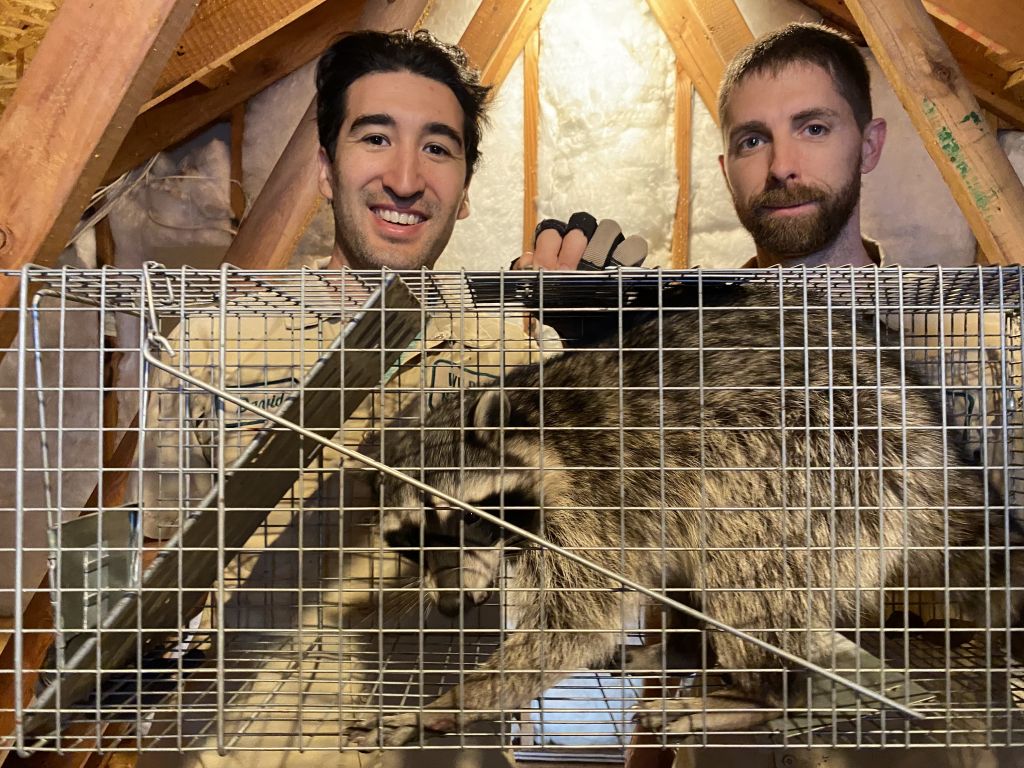
Why should I remove the raccoons?
Property damage is a serious concern with raccoons in your home or on your property. Raccoons are well-known for knocking over trash cans and making a mess in general. If you have small pets, such as small dogs or any cats, raccoons can possibly harm them. In addition, any fowl or other birds have the potential to be killed as well. Gardens are also commonly dug up by these masked bandits looking for food.
Far more important than the property damage risk with raccoons is the health risk. Raccoons are arguably the most well-known carrier of rabies, and they can easily give it to humans with a simple bite. In addition, their feces carry many different diseases that can potentially kill humans, including raccoon roundworm, salmonella, and E. coli. Clearly, raccoons need to be taken care of quickly.
How can I prevent raccoons?
Preventing raccoons might feel like quite the chore. Between your job and family life, you might feel like you have little time to take precautions to prevent raccoons. One of the best ways to prevent raccoons is to keep them out of your yard in the first place. Simply cutting down access to easy food sources will diminish the attractiveness of your property dramatically. Making sure all of your trash is put in a secure bin and that any pet food is cleaned up and secured will help a ton. In addition, keeping your yard clean in general will help reduce its curb appeal for raccoons.
Once you have taken precautions with your yard and property, you can start on the house. It is important to check all around the house, paying special attention to certain areas. Check the foundation really well and seal any holes you find with some all-weather sealant. Be sure to check along the roofline of your house, as well as the attic, as raccoons can oftentimes make pre-existing small holes larger to squeeze in. Seal these holes with metal sheeting or all-weather sealant. Always be sure to use high-quality materials when you are repairing any holes or gaps, as low-quality material can potentially cause even more problems due to the weather getting in or more critters getting in. Once you have inspected your home and made repairs, you should be well on your way to keeping critters out.
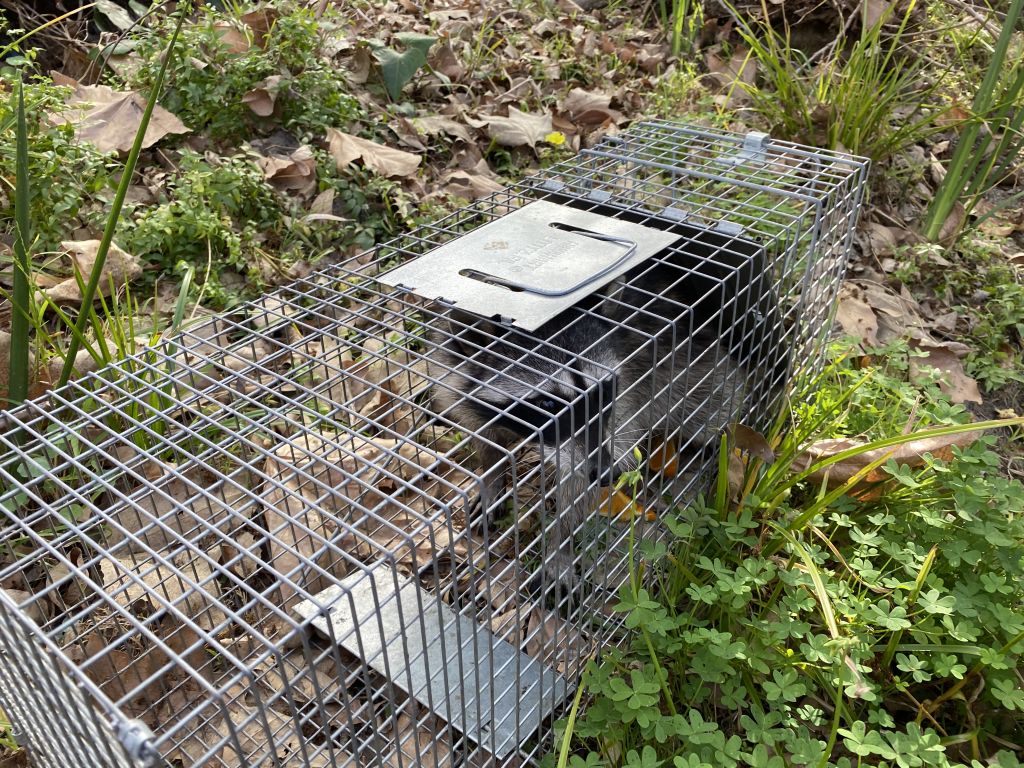
How do I remove raccoons?
Raccoon removal might sound straightforward and simple, but that is certainly not the case. When raccoons make their way into the homes of residents, they generally have one big purpose if they are female. They are looking to get into your attic to raise their young in a nice, warm, cozy place. This is where the biggest of all problems occurs. If a raccoon is removed by the homeowner with a cage trap or a one-way door, it is very likely that any babies left in the attic will die slow, painful deaths, all the while causing terrible odors in your home. This is the main reason why it is recommended to let professionals take care of raccoon removal. In addition, there are potentially serious health risks involved in trying to handle raccoons on your own. C&C Wildlife Control ensures that every raccoon, young and old, is removed from your home to avoid suffering and an incomplete job.
Why hire C&C Wildlife Control?
Since removing raccoons from your home is so important, it should be left to professional wildlife removal companies to take care of in most cases. Here at C&C Wildlife Control, our job is not finished when we remove the raccoons from your property. We take special care to prevent any future infestations, all the while examining your home and property for any other pest problems. C&C Wildlife Control has a service area of Hartford and Tolland Counties in Connecticut. It is important to keep C&C Wildlife Control in mind when you need a job done right the first time, whether it is simply removing raccoons, performing exclusion services, doing cleanup and sanitation, or performing damage repair and attic restoration. If you want to hire a company focused on results, all while maintaining ethics, humane treatment, and integrity, give C&C Wildlife Control a call today.
What Damages Do Raccoons Cause to Your Home
Raccoons are notorious for their destructive capabilities. Thanks to their sharp teeth and claws, as well as their dexterity, they will wreak innumerable damage to your home once they gain access. Not that they’re deliberately trying to be a pain in the ass. It’s just in their nature. In this post, we explore some of the most common damages caused by raccoons. That way, you’ll fully understand why it is important to handle a raccoon infestation problem as soon as it occurs. Let’s get right to it.
Insulation damage
If a raccoon gets into your attic, the first thing it does is build its nest, and your insulation makes the perfect building material because it is comfy. Hence, the raccoon will tear up your insulation to build its nest. And if you have a mother raccoon and her babies (called kits), you can expect her kits to tear up your insulation just for fun. Not to mention the droppings and urine they use to soil your insulation. When your insulation is damaged, it invariably reduces the energy efficiency of your home. That is ultimately reflected in an increased energy bill.
Chewed wires
Wires also make for good nesting material. That’s why raccoons in your attic or within walls will chew on them. Exposed wires can lead to partial contact that can damage electrical appliances in your home. But even worse, exposed wires pose a serious fire hazard. Do you know that 9% of fires are caused by electrical wires?
Damage to wood
With their sharp teeth, raccoons are known for chewing on wood, especially in the attic. Some do it to secure additional building materials, while others do it just for fun. But whatever the case, damaged wood can weaken the structural integrity of your building, especially if it’s a load-bearing wooden frame.
Damage to lawns and gardens
Raccoons are known to dig holes, create ground burrows, and crawl spaces through the attics. Hence, a raccoon in your property can dig unwanted holes in your lawn, causing damages that will require a lot of money to fix. As omnivores, raccoons will eat fruits and vegetables in your garden. Not to mention the damage they cause to plants. If given the chance, a raccoon will also rip trash bags, spewing trash about your property, in search of food.
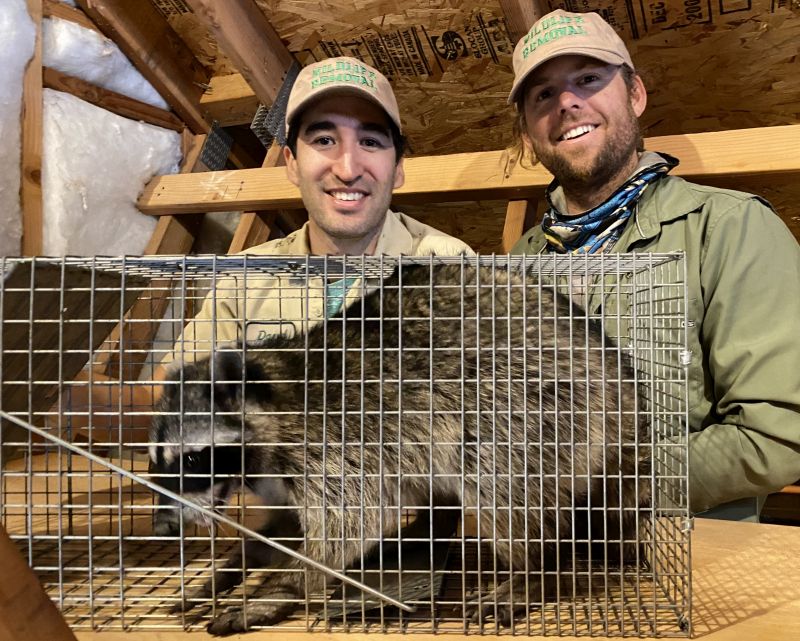
Reduction in air quality
Raccoon droppings and urine have a foul smell. If you have a raccoon in your home, soon enough, the putrid smell from its feces and urine will be circulated through the HVAC system. The terrible odor can be discomfiting for you and your family.
What’s more, a raccoon may die in your home for a long list of reasons. If you have a dead raccoon, it’s only a matter of time before the decomposing carcass gives off a putrid smell that can last for weeks or months, making it unbearable to breathe.
Risk of diseases
Raccoons carry several zoonotic diseases that can affect both humans and pets. For instance, raccoon droppings usually contain roundworms. And while the roundworm doesn’t harm the raccoon, it can cause serious illness in humans.
These masked bandits can also spread diseases through biting, scratching, and even through their saliva and bodily fluids. Other examples of diseases spread by raccoons include rabies, canine distemper, raccoon parvoviral enteritis, infectious canine hepatitis, and pseudorabies.
A proactive response to raccoons infiltrating your home and property is the only long-term strategy that will effectively keep you safe from a raccoon infestation. And if you’re dealing with a raccoon infestation, C&C Wildlife Control can help you deal with the problem with our proven and humane approach to wildlife control.
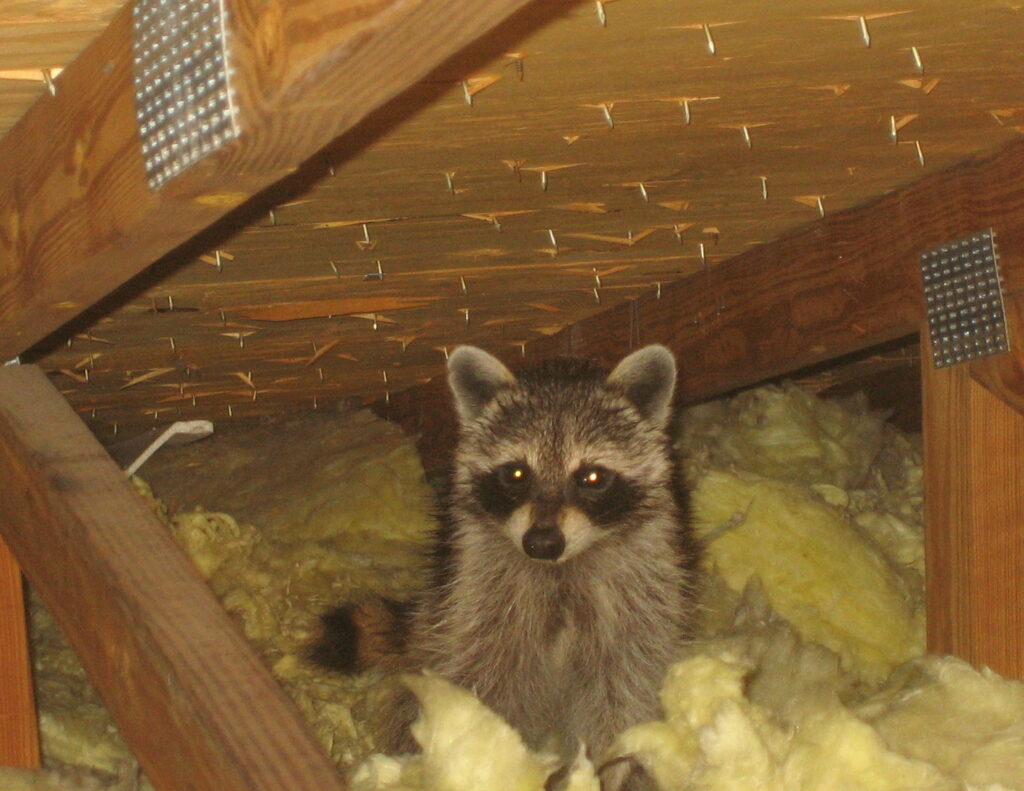
How to Remove Raccoons from the Attic?
Arguably the most notorious nuisance animal is the raccoon. Raccoons are highly opportunistic creatures that have become more prevalent in urban areas as they learn to adapt and coexist with humans. Since raccoons are so adaptable and intelligent, they are able to make their way into attics quite frequently, presenting a whole host of health and property damage risks. Continue reading to learn how to remove raccoons from the attic.
What attracts raccoons to a property?
Raccoons are drawn to certain yards and homes based on their ability to find shelter and to find easy sources of food. More often than not, a raccoon is drawn to a property because the garbage or pet food is within easy reach for them, leading them to explore the property more, find more food, and then find suitable shelter. Many times, raccoons can also be drawn to yards because of small pets or fowl located on the property. Beyond the food attraction, the shelter part of the equation is easy to understand as well. If there is easy access to a warm location, such as an attic or a brush pile, you can bet the raccoons will love it.
What problems do raccoons cause?
The main problem that raccoons cause is the potential for them to spread disease. The diseases that raccoons carry are serious enough that they can potentially cause severe illness or even death to humans and their pets. Raccoon roundworm, rabies, and leptospira are all carried by raccoons and can all be very dangerous.
Putting aside the health risks, raccoons are also very destructive. When a raccoon wants to get into an attic, it will chew or bludgeon its way in. This can leave large entry holes that can then allow more nuisance animals access. Once inside, raccoons tear up insulation, gnaw on building materials, and can even have their young in your attic. Because of these problems, removing raccoons should be a top priority.
How can raccoons be prevented?
Preventing raccoons from getting into your attic can take a two-prong approach. The first step is to make your yard less appealing to them. This can be done by securing any trash and pet food and cleaning up any debris piles in your yard. The second step is to secure your home. Begin by examining the interior and exterior of your home, paying special attention to any holes, cracks, or gaps. If you find any of these problem areas, use aluminum sheeting, new lumber, or an all-weather sealant to fix them. By performing these simple steps, raccoons will be much less likely to get into your attic.
How should raccoons be removed?
Removing raccoons can be a simple or very difficult task, depending on the severity of the problem. When there is just one raccoon in your attic, the removal can be as simple as setting a baited cage trap and removing the critter. Another removal method is to install a one-way door that lets the raccoon out, but will not allow them a way back in.
One very important consideration to keep in mind is that often a raccoon that gets into your attic will be a mother. This mother raccoon could have babies in your attic, and if you remove the mother, the babies will die slowly and will make your home smell terrible. For this reason, it is highly recommended to hire a professional wildlife removal company to perform the removal for you. These experts will be able to remove the raccoons and also perform services that will prevent any future infestations from occurring, saving you massive amounts of money in the long run.
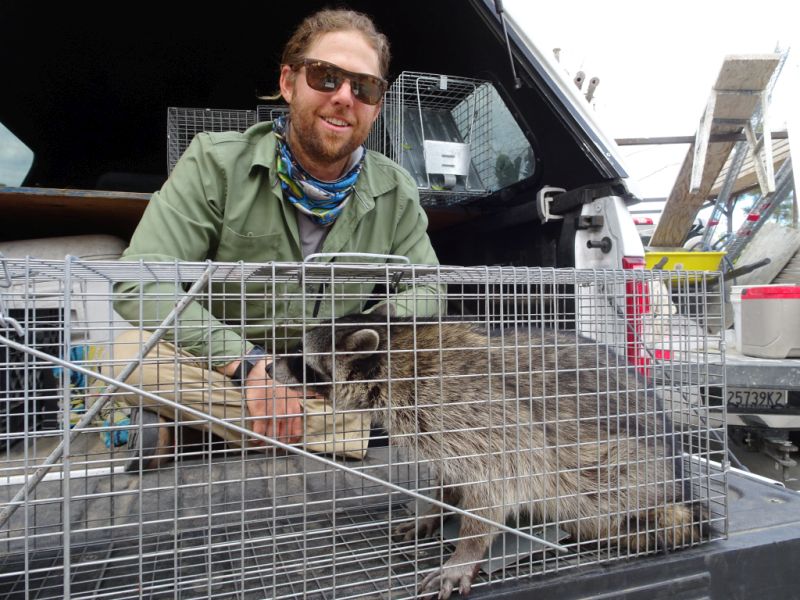
How to Prevent Raccoons from Entering Your Property
Raccoons can seemingly find their way into many different places, as they have become more and more comfortable around humans. Since raccoons can cause many different problems for homeowners, their children, their pets, and their gardens, it is very important to learn about some ways to keep them out. Continue reading to learn how to prevent raccoons from entering your property.
Make Your Yard Less Attractive
One of the most effective ways to prevent raccoons from entering your property is to not give them a reason to. There are two main items that raccoons look for on properties: sources of food and sources of shelter. By limiting these two items, raccoons will likely pass your yard by for a better one. The first thing to do is to keep all easy food sources out of the reach of raccoons. Put all pet food and trash in secure areas, as this will prevent the smell from attracting critters. If you have fruit trees or vegetables, be sure to clean up any dead fruits or vegetables, as these can attract raccoons.
On the sheltered side of things, there are a few steps you can take. The first step would be to trim any tall grass or weeds that can be found on your property. Next, be sure to clean up any fallen tree limbs, wood piles, or other debris piles. By doing these things, not only are you removing shelter for raccoons, but you are also removing shelter for small animals that raccoons like to eat. This tip alone should help prevent raccoons from entering your property.
Build an Electric Fence
One very effective method for keeping raccoons out of your property is to build a fence that consists of a wire or two that are electrified at the top of the fence. Since raccoons are great at climbing, an ordinary fence won’t keep them out. A benefit of this fence is that it keeps out many other nuisance animal species as well. In order for this to be effective, be sure to use a fence that extends below the ground a couple of feet to discourage digging as well. If this seems too costly, there are other tips to keep raccoons out that are much cheaper.
Use Repellents
Many people swear by using a certain type of repellent to keep raccoons off of their property. These repellents can be store-bought manufactured ones, or they can be any number of the various natural repellents people make and use. For example, a common homemade repellent is mixing cayenne pepper and water in a spray bottle and spraying it around your yard. The effectiveness of these repellents varies depending on weather and many other variables, so do not rely completely on repellents.
Let Your Dogs Roam
One tip that many may already be using but do not realize it is to allow your dog to patrol your yard. When your dog is out and about, raccoons will be much less likely to come onto your property, as dogs will scare them away. While this tip is great for preventing normal raccoons, there is the potential that a sick raccoon could be more aggressive and provoke your dog into attacking it. The best way to make sure that this is a non-issue is to keep your pet’s vaccines up to date.
Hire a Professional
One of the best ways to prevent raccoons from entering your property is to hire a professional wildlife removal company. These experts have dealt with all kinds of scenarios and will know exactly how to take care of your problem. Not only can they remove any raccoons, but they can also provide suggestions and services that will prevent any future raccoons.
